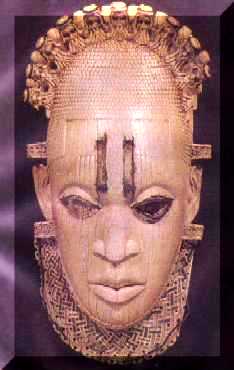THE EDO PEOPLE:
BRIEF HISTORY AND BACKGROUND
The Edo People, made up of the Binis, the Afemais, the Esans, the Owans and the Akoko Edos, are a group of people that live in the mid-western part of southern Nigeria, somewhere between the old Western and Eastern Regions of Nigeria. They are about 4 to 6 million in population. The Edo People have a very rich history and culture. Their history, anchored by the Benin Kingdom, dates back to the period before the first millennium A.D. The Kingdom is one of the most enduring authentic African kingdoms that dates back many centuries. Benin Kingdom as it is known, emerged as a very powerful empire which once extended to Owo, Akure, and Lagos to the West, Onitsha to the East, and the Niger delta to the South in Nigeria. It was the first African Kingdom to establish diplomatic relations with an European world power (Portugal) in 1504.The kingdom developed an urban culture that encouraged distinctive art works in the form of bronze, ivory, and wood sculptures—frequently seen and easily identified in many international museums all over the world today.
The Benin Kingdom recently crowned (in late 2016) the kingdom’s latest uncontested monarch—Oba Ewuare II—in an elaborate centuries-old traditional ceremony which lasted several weeks. The newly crowned Oba Ewuare II is the 40th Oba of the Kingdom of Benin.
The Edo People all over the world (most especially here in the National Capital Region of the United States of America) have recently came to a very painful realization that the VERY RICH AND GLOBALLY ACCLAIMED CULTURE AND HERITAGE handed down to them by their ancestors and forefathers (and which defines them beyond any other definition that they can bestow upon themselves) is now rapidly dying a slow death. Their world acclaimed Benin arts and artifacts, crafts and “carvings” are scattered, stored or proudly displayed by other people as historical treasures and relics in museums and other places all over the world. The Edo People do not have a place of their own, anywhere in the world outside of Edo State, where they can tell their own history, display their cultural heritage and proudly promote it as it should be promoted.
They have therefore come to a resolute determination that this should not be allowed to continue and that this Globally Acclaimed Culture of theirs MUST BE PRESERVED by all affordable and legal means necessary. To begin to do that, a consensus was reached be all concerned that a “Center-Point” or grand facility worthy of the “Richness and Globally Acclaimed” nature of the culture needs to be built and established in the DMV area (Washington, DC, Maryland and Virginia metropolitan area) to serve as the corner stone/focal point for the education, promotion and propagation of the Edo Culture and
Heritage while also raising its status and awareness universally. Hence the birth of a noble idea to build and establish The Edo Cultural and Exhibition Center in the National Capital Region of the United States of America which will serve the aforementioned purpose of educating, promoting and propagating the Edo Culture and Heritage while also raising its status and awareness worldwide.



PURPOSE, NEED AND BENEFITS
The purpose and benefits of the project are numerous. Top among them are the following:
- To establish and maintain a contemporary community – centered cultural & exhibition center alternative to the traditional cultural center in the DMV area with a dual focus of functioning as a contemporary cultural & exhibition center and a community center all-in-one.
- To showcase, promote and tell the story of the rich cultural heritage, artifacts and arts of the Edo people of Nigeria and West Africa, as it has never been showcased, promoted and told before in the DMV and the United States of America. This in a community (the DMV) that is rich and bubbling with Nigerian, African and African-America populations that currently lack such a center and will welcome it with open arms.
- To organize Edo and other Nigerian, African and Africa-American cultural educational and entertainment events, on a regular basis, for the benefit of the large African and African-American population in the DMV. This will include the provision of ongoing educational literature series and updates on Edo and other African and Africa-American cultures in the DMV.
- To facilitate and encourage local and regional support for the sharing and integration of the various cultures and peoples of different cultural heritage across all demographics and governments in the DMV.
